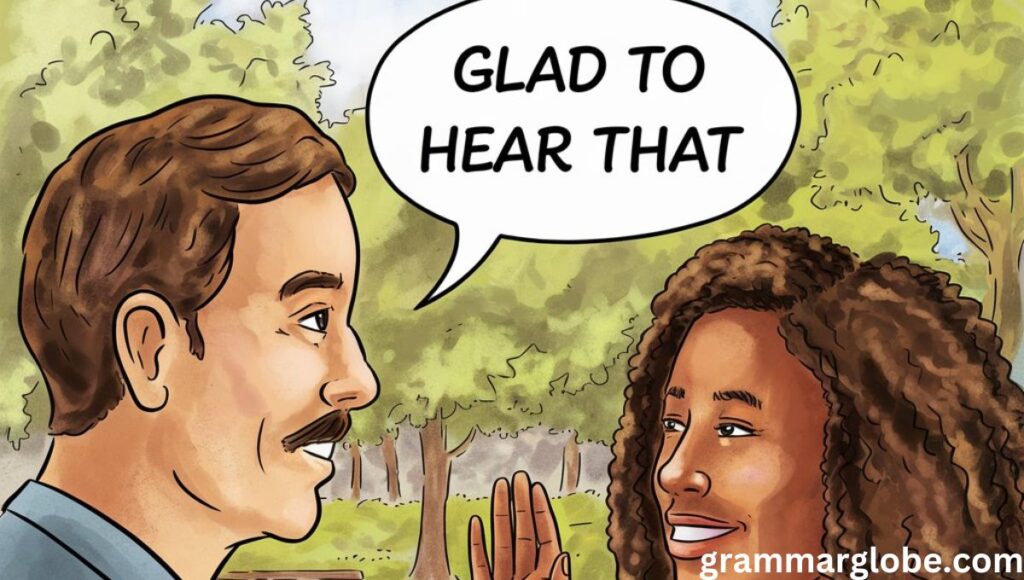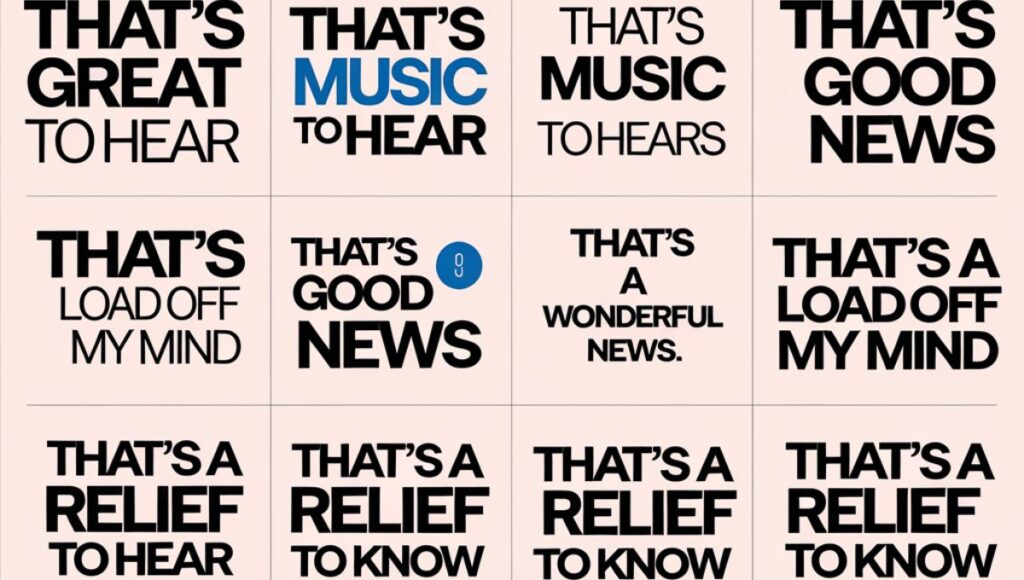When someone shares good news, your response matters. Using the same phrase repeatedly, like Glad to hear that, can feel robotic. That’s why knowing 13 other ways to say “Glad to hear that” can help you sound more natural and engaging. Whether you’re celebrating a friend’s success, encouraging a colleague, or responding in a professional setting, varied vocabulary enhances engagement.
This guide explores 13 powerful alternatives to “Glad to hear that”, explaining their contextual meaning, sentiment analysis, and real-world usage. By the end, you’ll have an expanded arsenal of joyful expressions to use in personal and professional settings.
That’s Fantastic News
When someone shares something truly exciting, saying “That’s fantastic news” shows that you’re thrilled by their update. The word “fantastic” elevates the sentiment, making your response feel more powerful and sincere. It conveys that the information shared has not only caught your attention but also genuinely impressed you.
This phrase works well in a variety of settings, both personal and professional. It’s perfect when you want to show your enthusiasm without sounding too formal. Whether your friend landed their dream job or your colleague secured a big client, “That’s fantastic news” expresses your happiness and admiration effectively.

The use of the word “fantastic” boosts the positive sentiment classification of the conversation. It helps communicate that you’re not just acknowledging the news, but you truly appreciate it. In both professional settings and informal chats, this phrase adds an extra layer of excitement and positivity.
In pragmatics in communication, such a response signals that you’re actively listening and engaged in the conversation. It enhances the connection between you and the other person by showing genuine appreciation for their accomplishments or milestones.
Moreover, this expression strengthens your ability to engage in interpersonal communication. When you tell someone that their news is “fantastic,” it helps to validate their feelings, contributing to their emotional well-being. It makes them feel valued and heard, a key element in building lasting relationships.
Whether it’s a casual text or a formal email, “That’s fantastic news” is an adaptable phrase that conveys genuine excitement and positivity. It’s ideal when you want to acknowledge someone’s success without over-exaggerating.
In summary, this phrase is more than just a response; it’s a way of reinforcing the positive mood of the conversation and highlighting the significance of the other person’s news.
I’m So Happy for You
Another way to respond when you hear good news is by saying, “I’m so happy for you.” This phrase works wonders when you want to show your genuine excitement and support. It’s a heartfelt response that helps deepen emotional connections by acknowledging the person’s joy in a personal and direct way.
The phrase “so happy” emphasizes the depth of your feelings, making your response feel more emotional. It’s ideal for moments when the news is meaningful and personal, such as a friend’s engagement, a promotion, or a family member’s success. This expression helps to convey not only your joy for the individual but also your positive feedback for their accomplishment.
In a professional setting, using “I’m so happy for you” can help foster strong workplace relationships. When you offer encouragement and celebrate a colleague’s success, it boosts workplace morale and creates a culture of acknowledgment and appreciation.
Saying “I’m so happy for you” creates an emotional bond between you and the other person. It’s a joyful expression that connects you emotionally and demonstrates your support for their achievement. It also expresses a level of sincerity that makes it stand out from more casual responses.
Emotion recognition is key here—this phrase helps you convey that you understand and share in the happiness of the other person. It makes the conversation feel more personal, letting them know you are truly happy for them and that their success matters to you.
In situations where you want to show your genuine support, “I’m so happy for you” will help reinforce your desire for the other person to succeed and feel valued. It strengthens your supportive communication by adding an empathetic touch, showing that their joy is just as important to you.
This phrase is also highly versatile. Whether in a quick text message or a face-to-face conversation, it’s a friendly, encouraging way to respond to any positive news shared.
What a Wonderful Update
If someone shares good news and you want to respond with a more formal tone, try saying, “What a wonderful update.” This phrase is professional yet still warm, perfect for workplace settings or when speaking with acquaintances. It’s an excellent option when you want to acknowledge the significance of the news without sounding overly emotional.
The word “wonderful” conveys positivity without being overly enthusiastic, making this response more suited for formal contexts. Whether it’s an update about a project, a report, or a business deal, “What a wonderful update” lets the person know that you appreciate the progress they’ve made.
In workplace settings, using “What a wonderful update” helps maintain a level of professionalism while still expressing genuine positivity. It’s a great way to keep conversations uplifting without crossing into overly casual territory.

This phrase also uses semantic similarity to phrases like “Glad to hear that” but adds a touch of formality. It’s ideal for business communications or when you want to acknowledge someone’s achievements in a way that feels both appreciative and respectful.
By using “What a wonderful update,” you’re also showing that you value the person’s time and effort. It acknowledges not just the outcome but also the hard work that went into achieving that success, which is an important part of celebrating achievements.
Finally, this phrase adds to your language enrichment by introducing a more refined way of responding to good news. It signals that you’re paying attention and that you value the information shared.
That’s Amazing to Hear
When you hear something that truly impresses you, saying “That’s amazing to hear” is an excellent way to show your awe and admiration. The word “amazing” carries a sense of surprise and deep appreciation, ideal for when the news you’ve received is unexpected or particularly extraordinary.
This phrase works in many contexts, especially when someone shares something they’re proud of or when the news has a lasting impact. Whether it’s a personal or professional milestone, “That’s amazing to hear” helps convey that you’re impressed by the other person’s success.
Using the word “amazing” shows that you’re not just happy for the person but that you truly recognize the significance of their achievement. It communicates sentiment analysis, conveying admiration and respect in your response.
In both personal and professional contexts, it’s important to acknowledge not just the outcome but the effort behind it. “That’s amazing to hear” does just that, showing that you appreciate the hard work or dedication involved.
In text analysis, this response fits well because it’s a more emotional response, making it less formal but still very impactful. It’s ideal when you want to add a touch of warmth to your response without losing the respect and recognition for the person’s accomplishment.
Lastly, this phrase is one that can be used across various conversational contexts, making it a flexible and effective option when responding to good news.
I’m Thrilled for You
“I’m thrilled for you” is a response that conveys a sense of excitement and enthusiasm. It’s perfect when someone shares news that genuinely excites you, such as landing a new job or getting engaged. The word “thrilled” suggests a high level of excitement and joy, making it an ideal choice for celebrating big milestones.
This phrase highlights that the person’s success or good news isn’t just something you acknowledge; it’s something that excites you personally. It adds an emotional layer to the conversation and shows that you’re truly invested in their happiness.
In both personal and professional contexts, expressing enthusiasm helps strengthen relationships. When you say, “I’m thrilled for you,” it communicates positive feedback and lets the other person know that their success is important to you.
In pragmatics in communication, this phrase helps create a more dynamic interaction. It boosts workplace morale when used to celebrate a colleague’s accomplishment or fosters a positive, supportive atmosphere among friends and family.
Ultimately, using “I’m thrilled for you” makes your response more impactful, showing that you share in their joy and excitement. It helps enhance collaborative culture and builds stronger bonds within your social circles.
What Great News
Sometimes, a more simple yet effective response works best. “What great news” is a versatile phrase that can be used in almost any situation. Whether someone shares good news with you at work or in a casual conversation, this phrase conveys positivity and enthusiasm without being overly dramatic.
“What great news” is an ideal phrase when you want to offer a positive and encouraging response without sounding too exaggerated. It’s the kind of response that works well in both personal and professional settings, making it a flexible addition to your conversational arsenal.

This phrase shows that you appreciate the news, and it has a warm, approachable tone. Whether it’s a quick chat with a friend or an important update from a colleague, “What great news” communicates your happiness for the other person in a clear, straightforward way.
In situations where you don’t need to use a highly emotional response, “What great news” is a perfect choice. It’s suitable for when you want to keep things light while still providing uplifting responses.
Absolutely Delightful
If you want to sound a little more refined or formal in your response, try saying “Absolutely delightful.” This phrase brings an element of sophistication to your conversation while still expressing excitement and positivity. It’s perfect for those times when you want to make a great impression.
“Absolutely delightful” is a way to elevate the tone of the conversation without sounding overly formal. It fits well in workplace settings, especially when you want to convey admiration or approval in a professional manner.
This phrase communicates genuine joy and approval, but it also works well in professional communications where you might not want to appear overly casual. It reinforces emotional connection by showing that you appreciate both the message and the person delivering it.
By using “Absolutely delightful,” you’re also expressing encouragement and motivation, making it an ideal phrase to support someone’s efforts. Whether in a meeting or a one-on-one conversation, this phrase helps create a positive atmosphere.
Finally, this phrase adds depth to your language enrichment, offering a more polished alternative to typical expressions. It helps communicate warmth while maintaining a level of professionalism.
That’s Just Awesome
When someone shares good news, saying “That’s just awesome” is a casual and genuine way to express your excitement. It’s often used in informal conversations with close friends, family, or colleagues who you have a relaxed relationship with. The phrase emphasizes that you find the news not just good, but extraordinary. The use of “just” adds emphasis, making your response feel even more enthusiastic.
The beauty of “That’s just awesome” lies in its simplicity. It sounds authentic and is easy for the other person to recognize as genuine excitement. This phrase works best when the news is significant, but you want to maintain a fun, lighthearted tone. Whether your friend has landed a new job or your cousin has won an award, this response makes them feel like their accomplishment truly matters to you.
What makes “just” so effective is its relatability. Unlike more formal or rigid responses, this phrase doesn’t come off as stiff. It has the perfect balance of enthusiasm without sounding exaggerated, making it ideal for many different situations. For instance, when someone shares personal achievement news, saying, “That’s just awesome!” comes across as natural and comfortable.
“That’s just awesome” works in various scenarios. Whether someone shares exciting news about a promotion, a new relationship, or a personal milestone, this phrase fits perfectly. Its casual tone helps keep the conversation grounded while still conveying your genuine happiness for them.
Ultimately, using “That’s just awesome” helps you stay conversational, positive, and supportive. It’s an excellent way to express joy without feeling forced. You show excitement in a simple yet meaningful way, making your response both sincere and friendly.
I’m Really Excited for You
When someone you care about shares good news, “I’m really excited for you” expresses heartfelt enthusiasm. This phrase goes beyond just acknowledging good news. It shows that you share in the person’s happiness and excitement. The word “really” intensifies the emotion behind the statement, indicating that you’re genuinely thrilled by their accomplishment.

What makes this phrase so effective is its emotional depth. You’re not just showing happiness for the person; you’re sharing their joy. When a friend shares big news, like getting a promotion or moving to a new city, saying, “I’m really excited for you” communicates that you understand how important this milestone is and that you’re celebrating it with them.
“I’m really excited for you” is versatile, working in both informal and professional settings. You can say it to a friend or colleague, and the sentiment will always feel appropriate. In the workplace, telling a co-worker who just landed a big client or completed a successful project that you’re excited for them shows support and recognition, helping build a positive professional relationship.
This phrase also works well because of its directness. People appreciate simple, clear expressions of emotion. “I’m really excited for you” doesn’t just convey enthusiasm; it makes the person feel validated. It tells them that their good news has had a positive impact on you as well.
In short, “I’m really excited for you” is a great way to express shared happiness. It’s genuine and shows your emotional investment in the other person’s good news. Whether they’ve reached a personal milestone or achieved something professionally, this phrase conveys your excitement in an authentic way.
Such Wonderful News
When someone shares great news, responding with “Such wonderful news” elevates the conversation and shows admiration for their achievement. The phrase conveys warmth and respect for the person’s accomplishment, acknowledging how special the news is. “Wonderful” adds a sense of refinement and sophistication, making it ideal for both personal and professional conversations.
In professional settings, “Such wonderful news” communicates genuine appreciation. For instance, if a colleague shares that they’ve successfully closed a deal or earned a promotion, saying this phrase shows that you recognize the significance of their success. It’s respectful, acknowledging their achievement without being overly exuberant, making it suitable for a variety of work-related contexts.
The phrase works equally well in personal settings. When a family member shares good news, like the birth of a child or getting into their dream school, “Such wonderful news” shows heartfelt joy. It doesn’t just acknowledge the event but celebrates the joy and importance of the moment. It adds a layer of appreciation to your response, letting them know that their news resonates deeply with you.
Moreover, “Such wonderful news” carries an air of elegance that suits both formal and informal communication. It’s perfect when you want to sound upbeat without being too casual. It demonstrates that you’re genuinely happy for them but in a slightly more polished, refined way.
In conclusion, “Such wonderful news” is a phrase that fits a wide range of situations. It shows admiration and appreciation for the news shared, making it a great way to express positivity. Whether the news is personal or professional, it communicates joy in a sophisticated, meaningful manner.
I’m Overjoyed to Hear That
When someone shares exciting news, responding with “I’m overjoyed to hear that” shows intense happiness and excitement. The word “overjoyed” adds emotional weight, indicating that you are not just pleased, but deeply thrilled by the news. This phrase is ideal when the news is significant, like a major life event or a significant accomplishment.
This expression conveys a deep level of emotional investment. It’s not just about hearing the news; it’s about feeling a strong emotional connection to it. If a close friend announces their engagement or a loved one shares the birth of their child, saying “I’m overjoyed to hear that” demonstrates that their happiness truly matters to you. It’s a phrase that emphasizes your joy for them while also validating their experience.
“I’m overjoyed to hear that” also works well in professional settings. For example, when a colleague shares news about a successful project completion or an award they’ve earned, this phrase communicates both admiration and excitement. It shows that you value their success and that their achievement brings you joy, enhancing your relationship with them.
This phrase is particularly effective when someone shares something life-changing or meaningful. It conveys not just happiness, but a sense of overwhelming joy. By using this phrase, you tell the person that their news has had a significant impact on you and that you are genuinely moved by their success.
In summary, “I’m overjoyed to hear that” is a powerful phrase that expresses deep happiness and emotional connection. It’s perfect for moments when someone shares life-changing or significant news, and it shows that you are genuinely celebrating their joy with them.
That’s Music to My Ears!
When someone shares good news, “That’s music to my ears!” is a fun and creative way to express your happiness. This phrase draws on the idea of hearing something so delightful that it feels like a beautiful melody. It’s a unique, lighthearted expression that conveys both excitement and enjoyment, making it a perfect response for moments when the news truly resonates with you.
This phrase works best when the news aligns with something you’ve been hoping or waiting for. For example, if a friend has been working hard on a project and finally sees results, saying, “That’s music to my ears!” shows that the outcome matches your expectations and brings you joy. It’s a playful way to acknowledge that the news is exactly what you wanted to hear.
The phrase adds a layer of sentiment to the conversation. It’s not just a response; it reflects how deeply the news affects you. “That’s music to my ears” suggests that you’re not only pleased by the news but also moved by it on an emotional level. This makes the phrase especially powerful in both personal and professional contexts, where genuine emotional connection is key.
Beyond its playful tone, “That’s music to my ears” is an expression of validation. It signals that the news has met or exceeded your expectations, which makes the other person feel that their success or achievement is important to you. It also helps to deepen the connection between you and the person sharing the good news.
In short, “That’s music to my ears!” is a delightful way to respond to good news. It’s a creative and heartfelt expression that communicates happiness while also adding a sense of excitement and emotional resonance to the conversation.
That’s Just What I Wanted to Hear!
If you’re waiting for news and it finally arrives exactly as you hoped, “That’s just what I wanted to hear!” is the perfect response. This phrase combines excitement and relief, showing that the news aligns perfectly with your expectations. It’s a way to express joy, but also satisfaction in knowing that things are unfolding as you hoped.
This phrase works especially well when someone’s success or good news is exactly what you wanted for them. For instance, if a colleague lands a big client that you’ve been working toward together, saying, “That’s just what I wanted to hear!” conveys both your support and relief that things have gone well. It celebrates their success while highlighting how much you’ve invested in the outcome.
The phrase also works when someone shares news that confirms something you’ve been anticipating. It’s a great way to acknowledge their success, while also expressing your personal stake in the outcome. It’s not just about their achievement, but about how their success has also fulfilled your expectations.
Using “That’s just what I wanted to hear!” shows a high level of engagement with the person’s news. It tells them that you’ve been following their journey and that you care about the outcome. It’s a way to show support that feels personal, thoughtful, and genuinely enthusiastic.
In conclusion, “That’s just what I wanted to hear!” is a great way to express happiness, relief, and satisfaction. It conveys that the news aligns with your expectations and shows that you genuinely care about the person’s success. Whether personal or professional, this phrase highlights both your excitement and investment in their achievement.
Conclusion
Replacing “Glad to hear that” with alternative phrasing makes your communication more engaging, expressive, and memorable. Whether you’re celebrating achievements, fostering supportive communication, or maintaining positive feedback in a professional setting, these phrases will enrich your vocabulary.
Next time you hear good news, which phrase will you use? Let us know in the comments!

Jenni Maic is a creative wordsmith at Grammar Globe, where she brings humor and wit to the world of puns and English grammar. With a passion for playful language and a knack for simplifying grammar, Jenni’s articles make learning engaging and entertaining. Discover her work at https://grammarglobe.com/.






